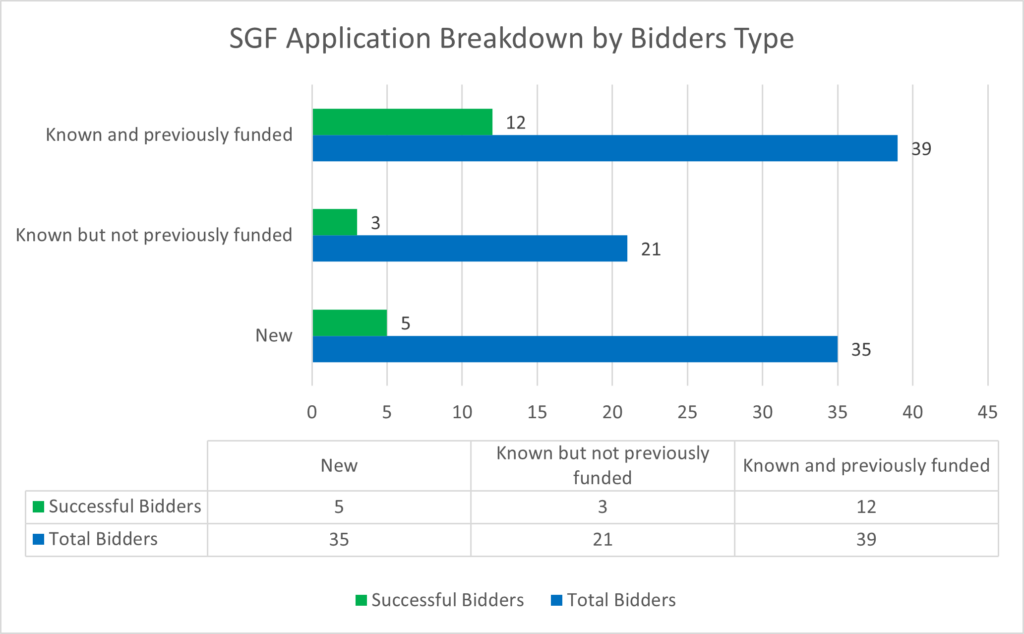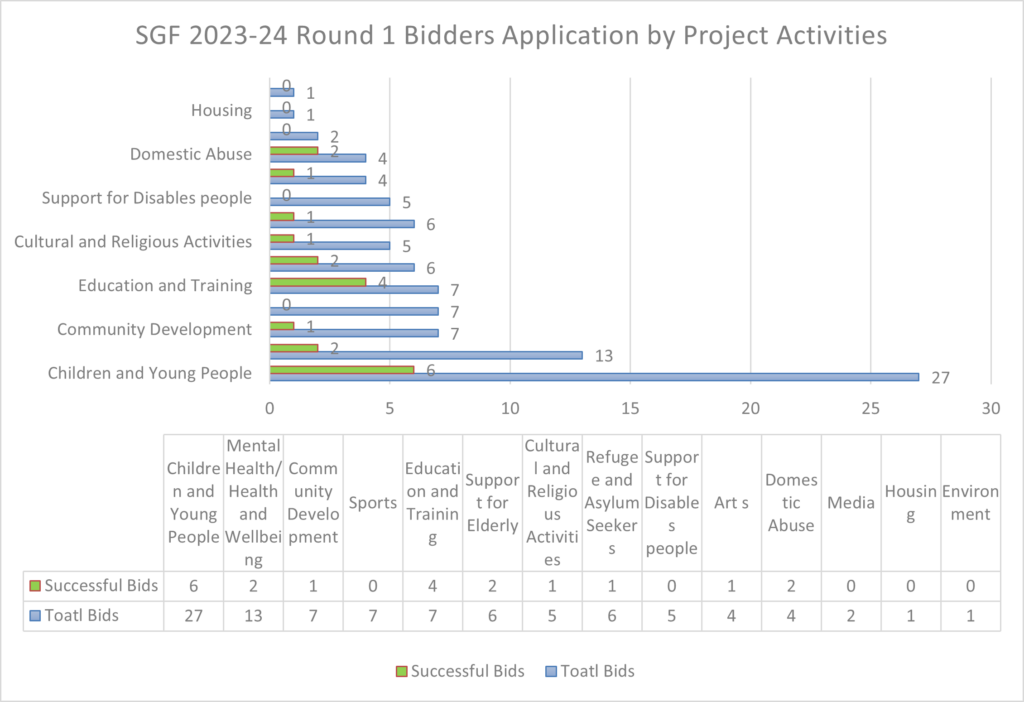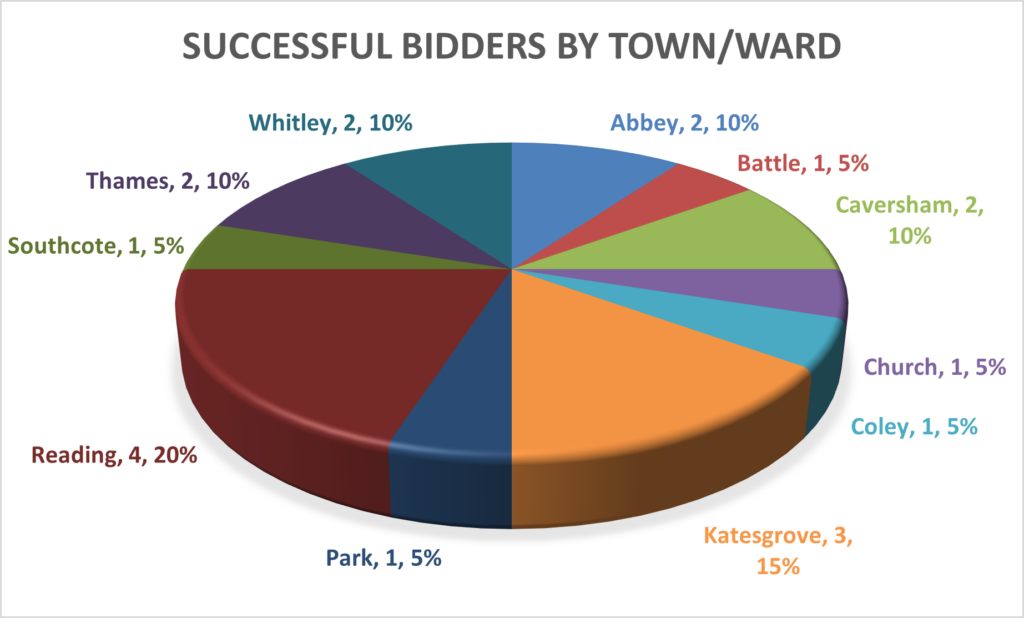Small Grants Fund 2023/24 – round 1 analysis
In total Ninety-Five applications were received for the Small Grants Fund 2023/24 Round 1 totalling just under £500K worth of bids and assessed against the set criteria of the Tackling Inequality Strategy. The number of applications received for this round was substantially higher than the previous two rounds where we received approx. 70 applications per round). This indicates around 36% of the increase in application. Due to the volume of applications, we received for Small Grants Fund 2023/24 Round 1, we can’t guarantee every application we received will be successful or funded. Therefore, funding of £100k was only possible to allocate to 20 successful applications at this round.
We are thankful to our key VCS partners for promoting SGF and special thanks to RVA for organising Small Groups Learn and Share Network on 4 July.
1. SGF 23-24 application breakdown by bidders type

Among the 95 applications, 39 bidders were previously funded though SGF previous round.
21 were known but not previously funded and it was good to see 35 new applications from new VCS organisations.
Out of 20 successful bidders, 12 were known and previously funded, 3 were Known but not previously funded and finally 5 were new VCS organisation.
2. SGF 23-24 application breakdown by project activities

As shown in the information above, the most common project activity bidders addressed was the need for Children and Young People related projects (Including vulnerable adults and families). Mental & General health related projects were second most popular topic.
Among the twenty successful bidders, the children and young people related project were most successful bids with 35% success rate. Education and training related project were able to secure 20% of the funding for the previous Small Grant Fund.
3. SGF 23-24 application breakdown by organisation size
| AGF 23-24 analysis by organisation size | Total application | Successful bidders | Unsuccessful bidders |
|---|---|---|---|
| Small organisation | 59 | 8 | 51 |
| Medium organisation | 11 | 3 | 8 |
| Large organisation | 25 | 9 | 16 |
| Total | 95 | 20 | 75 |
Applications from the small VCS organisations was higher than medium and large organisations. However, the success rate for small organisation was slightly lower than larger organisation. The success rate of large organisation is 45%, small is 40% and medium is only 16%.
4. SGF 23-24 application breakdown by area covered by bidders projects
4.1 Successful bidders project analysis by ward/town
| Ward/town | Successful bidders |
|---|---|
| Abbey | 2 |
| Battle | 1 |
| Caversham | 2 |
| Church | 1 |
| Coley | 1 |
| Katesgrove | 3 |
| Park | 1 |
| Reading | 4 |
| Southcote | 1 |
| Thames | 2 |
| Whitley | 2 |
| Total | 20 |

There are four bidders whose projects focused on areas with higher levels of deprived –
Whitley, Coley, Church and were able to secure funding from the current SGF round.
5. Lesson learnt
Successful bidders
The successful bidders were able to score higher because their application demonstrated-
- Clear evidence of need for the project and how they will be going to deliver their project.
- Outline the outcomes benefits and demonstrate the needs of local community.
- Good evidence of partnership working showing the how their project linked with partner’s project.
- Good balance between delivery of sessions and long-term sustainability.
- How successful delivery of their project will have impact in people life.
- How awarded fund will be used proving their budget breakdowns.
- Urgent need for vulnerable people with strong evidence of need and clear ability to deliver the project.
- How their projects will help in tackling the inequalities.
- Real growth in their project and future potential for long term funding.
- Their reach to diverse communities.
Unsuccessful bidders
The SGF bidders failed to score enough score because of following reasons:
- No evidence of real need for the project and how project will address that need.
- Project only targeted limited number community people to benefit.
- Does not demonstrate the local need or local impact form their project.
- Failed to provide breakdown of their spending for the project.
- Not providing enough information around need and failing to provide clear delivery plan for the project.
- Requested funding for irrelevant expenses like paying rent and buying equipment’s and failed to demonstrate theme of SGF i.e. tackling the inequalities.
- Requested funding for activities which were already funded and cover by Closing the Gap funding.
- Doesn’t clearly outline the community data/research/feedback/evidence etc.
- Not clearly demonstrating how partner organisation will contribute to project activities.
6. List of successful organisations and their projects
Age UK Reading: Creation of a new dementia club in north Reading for up to nine people with the disease and their carers. Includes recruiting and training staff and volunteers to run the club.
Baker Street Area Neighbourhood Association (BSANA): Annual Street party specifically targeted to increase knowledge and awareness of the climate emergency though a fun and engaging event.
Becoming Mums-partnership with Alana House: A community project run by PACT which provides a holistic and trauma-informed approach to support and empower post-natal women facing multiple disadvantages through creative workshops and peer-on-peer support.
Berkshire Women’s Aid (BWA): Providing one-to-one and group work to support the most vulnerable children at a crucial stage of development. Reaching families from diverse communities who are less likely to engage with mainstream services, and where domestic abuse, in all its forms, is often hidden and not talked about.
Browns Community Services CIC: Creating a support worker and project manager for the 4Es to Employment programme which builds self-confidence and self-esteem so individuals can access volunteering, training, and employment.
Caversham Muslim Association (CMA): Recruiting of a Community Development Coordinator and the provision of youth activities and education as well as sessions specifically for women.
Dance Reading: Vocational training for 15 young people experiencing socio-economic disadvantage and disability. To give the opportunity to carry out tailor-made work experience and the opportunity to gain UCAS points to assist with their future.
Dingley’s Promise: Providing dedicated small group support for up to four children over 24 weeks using new resources and techniques to address emotional and social needs and having a significant impact. Contributing to the sensory library and holiday play schemes working with 50 outreach families and to giving respite to carers.
Double Okay – Partnership with Rising Sun Arts Centre: To continue collaboration with the Rising Sun Arts to run creative, arts-based activity sessions for LGBTQIA+ and provide a Queer Social Team facilitating evening socialising for those at risk of isolation, health and social inequalities, discrimination, and loneliness.
First Days Children’s Charity: Part-funding the Safe Place to Sleep Project to ensure children in Reading who need a bed, bedding or a mattress but whose parents cannot afford one.
Grassrootz: Launching youth provision on Dee Road area giving opportunities, including positive experiences and activities and become role models, to the young people living there.
Lynn Everett (St Matthew’s): Providing food, utilities and running costs, friendship, and support to the residents of Southcote through the winter.
Me2 Club: Continuing support for 28 children with additional needs and disabilities in the Reading area and expanding the program by recruiting 10 volunteers to serve a greater number of children.
No 5 Young People: Providing urgent support to vulnerable and distressed children and young people through specialist counselling so they can go on to thrive and achieve in all areas of their lives.
Parenting Special Children: Providing a specialist triage service for families facing complex challenges. Enabling the provision of advice, referrals and information about partners who can also provide immediate assistance.
Parents And Children Together, PACT: Providing funding towards an additional Bounce Back 4 Kids Support Worker to support more than 10 domestically abused children and adults to heal from trauma.
Rank & File Theatre: To assist with providing weekly access to theatre studio rehearsal rooms at South Street Arts Centre and transport costs for disabled participants with access needs.
Reading Welfare Rights: Running one-to-one sessions to advise and empower parents, guardians or carers of adults with learning disabilities to be able to submit good quality benefit applications on behalf of the adults they are caring for.
South Reading Over 50s Social Club: Providing social opportunities for vulnerable older people in Whitley Wood and South Reading. This includes providing a once-a-month hot meal delivery, and volunteer recruitment.
Sport in Mind: Providing a weekly football session for 12 students or refugees with English as a second language for an academic year and 10 sport, exercise, and mental health workshops across south Reading giving 300 young people a greater understanding of mental health and the benefits sport and physical activity can have on wellbeing.